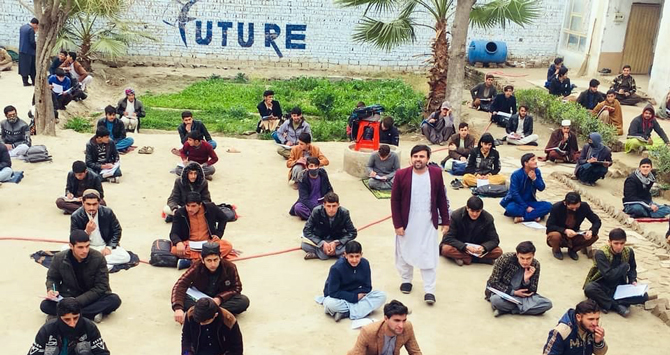KABUL, AFGHANISTAN | “At first, as the Taliban took over, I planned to leave at any cost,” said Zubair, a 2010 Afghan Seed, thinking back to the quick collapse of the Afghan government after the U.S. withdrawal last fall. “Then I thought, ‘If I leave and people like me leave, who will be here to serve our youth?’”
For most of his life, Zubair has dreamed of ensuring that all the children of Afghanistan have access to a quality education. It was an audacious hope given the limits posed by financial status, location, and gender. As the country’s future, and particularly the rights of women, grow murkier by the day, so do the chances of this hope ever becoming a reality. But some dreams—even those with significant risks—are worth holding on to.
“If we want to have change in Afghanistan, we have to educate this generation—it is the only way to combat extremism and bring peace and stability,” he said. “There are many great minds here and if we help them, they can contribute positive change to this country and to the world.”
At just 25, Zubair has already helped thousands of Afghan youth receive a quality education and continue their studies in college.
Inspired by his childhood experiences of being turned away from school when his family was unable to pay tuition, Zubair established an educational center in 2017 that offered classes and college test-prep for low or no cost to students in remote areas of the Nangarhar Province.
“We had around 70 boys in the beginning, most with extremist mindsets. We tried to teach them about new scientific inventions, share with them what was going on in the world, and tried to impart that it’s up to us all to become educated so we can make Afghanistan a better place,” he said. “They came in knowing nothing, and some of them actually went on to establish their own educational centers.”
He estimates that more than 10,000 students came through his center, but after a few years, he said threats from individuals claiming to be the Taliban and ISIS became too frequent, and too intense.
In 2020, he moved to Kabul and established Esmati Academy, where he offered free or low-cost education in math, sciences, literature, geography, and more to youth ages 14-20. Demand was so high, that even though he couldn’t afford chairs at one point, dozens of students still showed up for test prep, sitting outside on the ground.
Since the Taliban reclaimed control last fall, however, girls have not been allowed to attend in-person classes beyond the sixth grade. And while he does make online classes are available, the World Bank estimates that only about 13.5 percent of Afghans have Internet access, leaving the majority of students, especially girls in rural areas, with no options.
Undeterred, this spring Zubair applied for and received a $1,000 Seed Action Grant, a fund designated to help support Seeds of Peace alumni projects in need of emergency funds. His goal is to record lessons in each subject and grade level that will then be distributed on CDs and USB drives to students.
He also recently launched the Afghanistan Volunteer Teachers Movement, to which 400 university students applied to address a nationwide shortage of qualified teachers, and he is also distributing training videos to teachers in rural areas, many of whom are underqualified to teach their courses at international standards.
It’s an extremely laborious task, and one that could likely attract the ire of the Taliban, but with time and care, he thinks it is possible.
As he sees it, there really is no other choice.
“This is our country, and we have to fight for change,” he said. “I want every girl, every boy, to have access to education—not the kind that makes them extremists or robots. I want them to think for themselves, to have their dreams and go after them. I know it has risks but I want to do it.”


